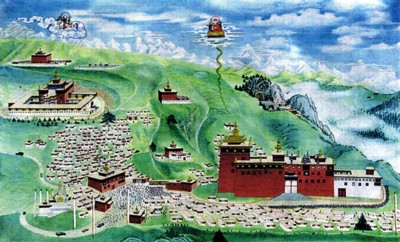Palpung Monastery: Difference between revisions
Jump to navigation
Jump to search
mNo edit summary |
No edit summary |
||
| Line 1: | Line 1: | ||
[[Image:Palpung.jpg|frame|Traditional painting of Palpung Monastery in Tibet]] | [[Image:Palpung.jpg|frame|Traditional painting of Palpung Monastery in Tibet]] | ||
'''Palpung Monastery''' or '''Palpung Chökhor Ling''' (Tib. དཔལ་སྤུངས་ཆོས་འཁོར་གླིང་, [[Wyl.]] ''dpal spungs chos 'khor gling'') was founded in 1729 by [[Situ Panchen Chökyi Jungné]] under the patronage of the King of [[Dergé]], Tenpa Tsering (1678-1738). Thereafter it replaced [[Karma Gön]] (Wyl. ''lho kar ma dgon'') near Chamdo as the seat of the [[Tai Situ]] incarnations, who themselves became known as the Palpung Situ. | '''Palpung Monastery''' or '''Palpung Chökhor Ling''' (Tib. དཔལ་སྤུངས་ཆོས་འཁོར་གླིང་, [[Wyl.]] ''dpal spungs chos 'khor gling'') was founded in 1729 by [[Situ Panchen Chökyi Jungné]] under the patronage of the King of [[Dergé]], [[Tenpa Tsering]] (1678-1738). Thereafter it replaced [[Karma Gön]] (Wyl. ''lho kar ma dgon'') near Chamdo as the seat of the [[Tai Situ]] incarnations, who themselves became known as the Palpung Situ. | ||
==Internal Links== | ==Internal Links== | ||
Revision as of 22:59, 21 November 2017

Palpung Monastery or Palpung Chökhor Ling (Tib. དཔལ་སྤུངས་ཆོས་འཁོར་གླིང་, Wyl. dpal spungs chos 'khor gling) was founded in 1729 by Situ Panchen Chökyi Jungné under the patronage of the King of Dergé, Tenpa Tsering (1678-1738). Thereafter it replaced Karma Gön (Wyl. lho kar ma dgon) near Chamdo as the seat of the Tai Situ incarnations, who themselves became known as the Palpung Situ.